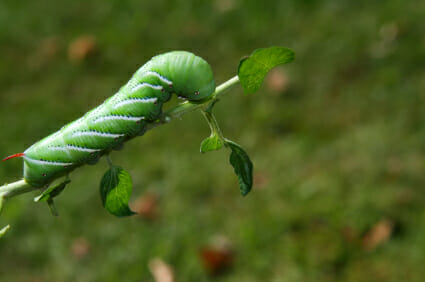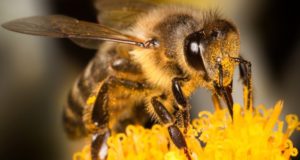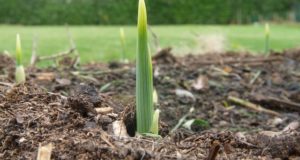 Summer has arrived in the Northern Hemisphere. The sultry season brings many gifts to your survival garden; an abundance of nourishing sunshine, refreshing summer showers, hours of evening light to tend your veggies, and the ripening of some of your tastiest crops. Unfortunately, in many locales, summer is also the high season for garden pests.
Summer has arrived in the Northern Hemisphere. The sultry season brings many gifts to your survival garden; an abundance of nourishing sunshine, refreshing summer showers, hours of evening light to tend your veggies, and the ripening of some of your tastiest crops. Unfortunately, in many locales, summer is also the high season for garden pests.
With that in mind, I’ve decided to take a short break from our exploration of the various vegetable families to spend a few moments to talk about what’s bugging you now—bugs!
Some folks get a very primal response when they see that their plants are under attack by uninvited critters. They rush out and get the most potent insecticide spray they can find and start spraying hither and yon, determined to wipe out all traces of the leaf-munching, root-boring, fruit-rotting invaders who are destroying their vulnerable veggies. This is a bit like using an M4 carbine on full automatic to rid your bedroom of a few annoying mosquitoes; you might get the job done but you’re guaranteed to cause a whole lot of damage in the process.
In addition to poisoning your produce and your soil, you’ll also be killing the pest predators that will help provide long-term protection from hungry little fiends once you’ve got your garden back into shape. What’s the point of growing good food only to slather it with stuff that is going to make you sick down the line? Why would you want to annihilate a wide variety of useful allies to rid yourself of a few pests?
One of the first things to understand when you’re looking at a plant that is under attack is you’re looking at a plant that probably wasn’t healthy before the creepy-crawlies began their feast. Most insects only attack unhealthy plants. If you’ve got unhealthy plants, you’ve probably got unhealthy soil. The best way to cure this situation is mixing compost into the soil and using a balanced organic fertilizer like Protogrow. Using one of those turbocharged chemically enhanced unbalanced fertilizers you’ll find in the brightly colored packages at your local garden store is only going to make the matter worse in the long term. Your soil is a living system that requires gentle, loving attention. Using harsh chemicals throws the whole shebang out of whack. If you’re lucky, you might get one decent crop before your soil starts producing mushy, nutrient-deficient vegetables which attract unfriendly bugs of all sizes and shapes. Properly balanced living soil gives your plants the vitality they need to avoid attracting many of the most harmful garden pests.
The key reason I’ve been covering vegetable families in recent columns is to help you understand not only the benefits of growing members of these families in your survival garden, but also to give you a good base to understand the importance of crop rotation. We’re going to cover that topic in a whole lot more detail in a future column but right now, I just want to touch on the danger of growing the same vegetables (or members of the same vegetable family) in the same plot of ground year after year. Growing the same plant in the same spot year after year strips the soil of its natural fertility. Weak soil produces weak plants, and weak plants attract strong bugs.
Failure to rotate your crops gives the insects that feed off that vegetable family a chance to set up housekeeping. They’ve got themselves an abundance of good food and are confident that the same good stuff will be arriving next year to feed future generations. They have no incentive to pack their bags and explore new territory. You bump into the same sort of thing with soil-borne diseases. Different diseases attack different kinds of plants. If you plant the same thing in the same spot all the time, you’re giving the diseases that attack that particular vegetable all the tools they need to thrive.
While there is a lot of work you can do to minimize the damage pests can do to your garden, it is a comfort to know that you are not alone in the battle.
Spiders, beetles, lizards, lacewings, centipedes, wasps, frogs, toads, and various birds enjoy dining on the annoying critters that enjoy dining on your vegetables. You want to encourage them to hang around your garden and snack frequently. A good layer of mulch provides a nice resting spot for various helpful beetles, and some dense matted grass at the base of your hedges provides more space for these allies as well as provides a nice home for ladybugs. A section of unmowed, undisturbed lawn near your garden will attract toads, lizards, and other helpful friends. If you’ve got a woodpile, you already know that wasps love woodpiles. Approach with caution and thank them for protecting your veggies.
When dealing with garden pests, never underestimate the benefit of a little manual labor. Hand-picking the uglies off your plants and squashing them at the start of an infestation not only provides a few needed moments of grisly revenge for some folks, it also can prevent the little buggers from establishing colonies. You might have to do this several times this season to keep the persistent pests like slugs under control. Personally, I’ve found a few night trips to the garden with a flashlight is an effective harvest time for slugs.
Another effective method to catch those persistent slugs involves beer. Just cut the bottom off a plastic bottle and bury it with about two or three inches above the ground. Pour some beer into your new slug trap and wait for the slugs to find it. You don’t need some fancy beer for this trap. Slugs really don’t care whether the hops were grown in some exotic location or barley was malted in an ancient abbey in the Alps, get a can of the cheapest stuff you can find. Make sure you’ve got the lip of your trap about two or three inches off the ground to avoid capturing any of the predatory beetles that will help control a variety of invading insects.
Copper is another way to protect your plants from slugs. Slugs hate copper because they get a shock when they try to pass over it. Copper rings or copper coated fabric around your plants can be pretty effective if slugs are driving you crazy this year.
If you happen to be raising ducks or chickens, you’ve got additional allies in your battle against a wide variety of garden pests. Let your ducks make regular visits to your garden. They eat a lot of bugs without doing much damage to your plants. As for chickens, bantams are the least destructive but I usually find it best to give the chickens free rein on the garden plots after harvesting. They’ll do a good job cleaning things out before your next planting and you’ll avoid the damage their beaks can do to delicate vegetables.
One of the more recent innovations in garden pest control has been the introduction of insect mesh. This is basically a net size small enough that most insects can’t pass through it, but your plants still get the light, water, and air they need to grow. It takes a little imagination and planning to get it strung up right, but a lot of reliable people swear by it. I’m trying it on a few sections of my garden this year and, although it looks a little weird, results have been pretty good so far. I’ll know more as the season progresses.
There are a few gardeners out there who seem to think that using plant extracts as insecticides is naturally all right because the stuff came from a natural source. The phrase “all natural” happens to be one of those things that gets my alarm bells ringing. You could label a bag of fresh poison ivy leaves as “all natural” but I wouldn’t recommend rubbing it on your skin! Likewise, I recommend a whole lot of caution when it comes to natural or “home-made” insecticides. Some of these remedies are pretty harmless, but others can be pretty dangerous to you, your garden, and the friendly predators that inhabit your garden. To turn an old phrase around, what is bad for the goose is also bad for the gander. I strongly advise using any insecticide only as an absolute last resort, and only after you’ve done a whole lot of homework to make sure that what you’re planning to use is suitable for use on the pest and plant you’re trying to treat. There is no one solution for every possible infestation and anyone who tells you different is just trying to lift a quantity of dollars from your wallet. Anything that kills every type of garden pest will kill just about every insect in your garden, including the beneficial ones, and just might cause a bit of damage to anyone who consumes the food you are growing.
Well, I hope this piece about garden pests has done a little to help save your sanity when the unfriendly critters come calling. Just remember, every garden is going to attract a few pests. That’s just the way things are and there is no use getting too upset about a little damage. If your soil is healthy and you are using a well-balanced organic fertilizer, then your healthy plants, a little manual labor, and your natural garden allies should keep things from getting out of control.
 Off The Grid News Better Ideas For Off The Grid Living
Off The Grid News Better Ideas For Off The Grid Living



